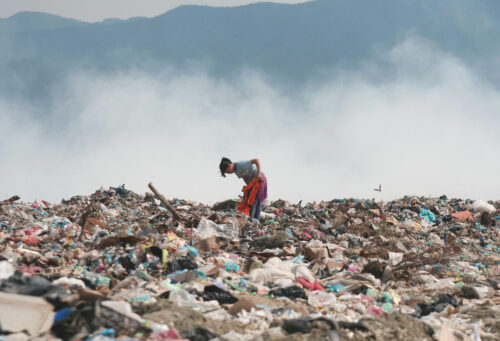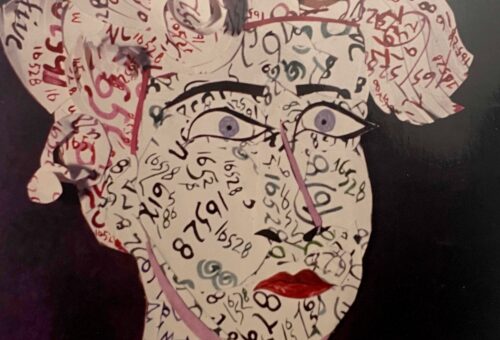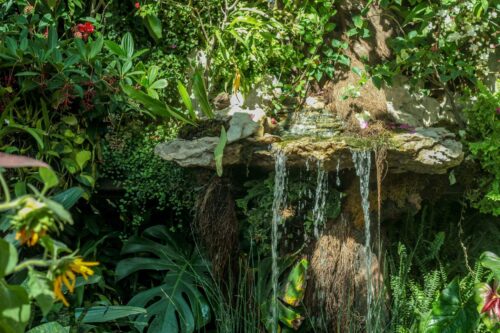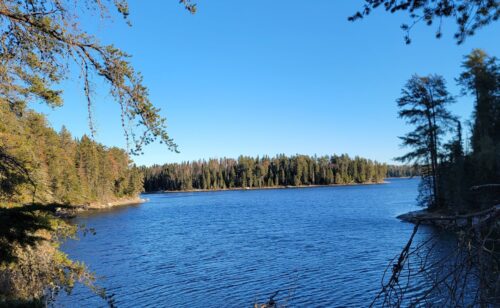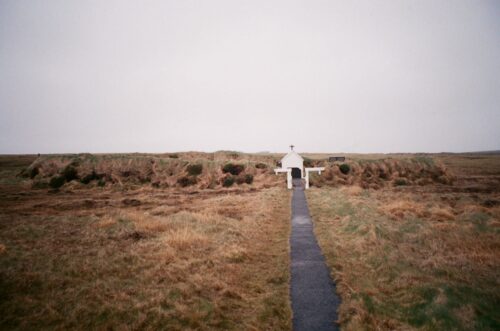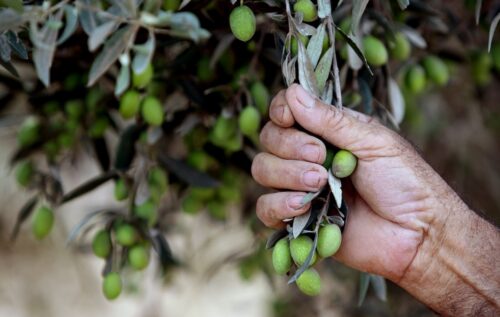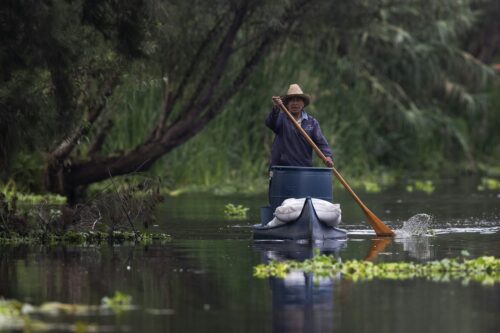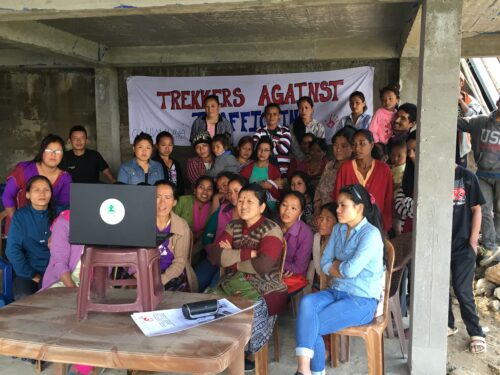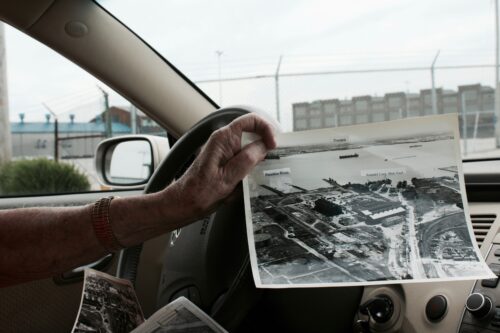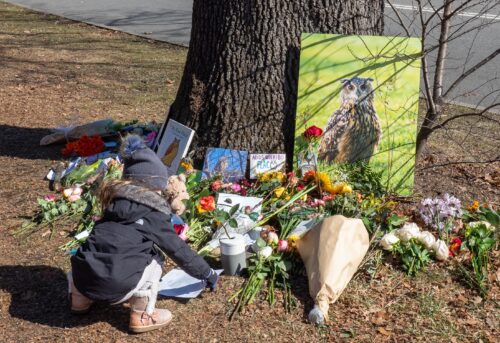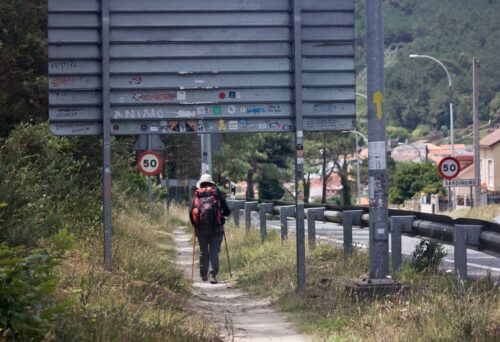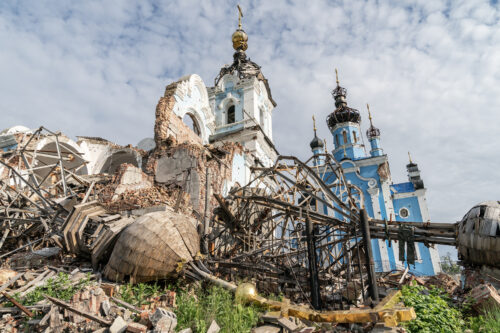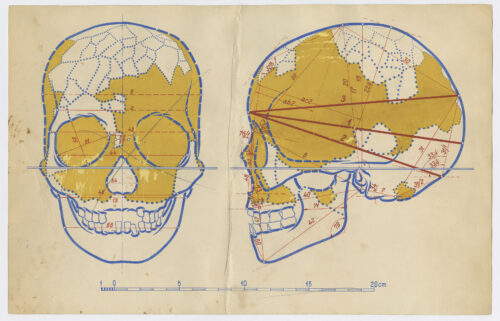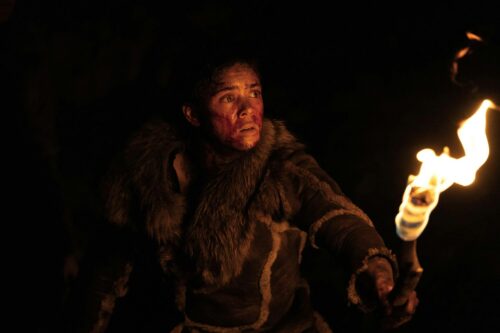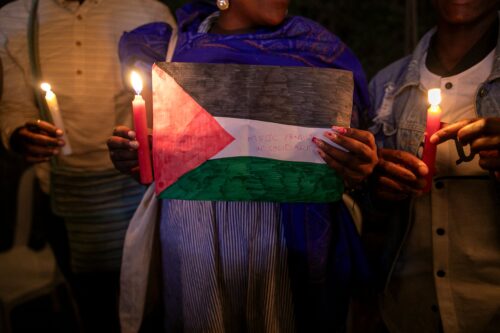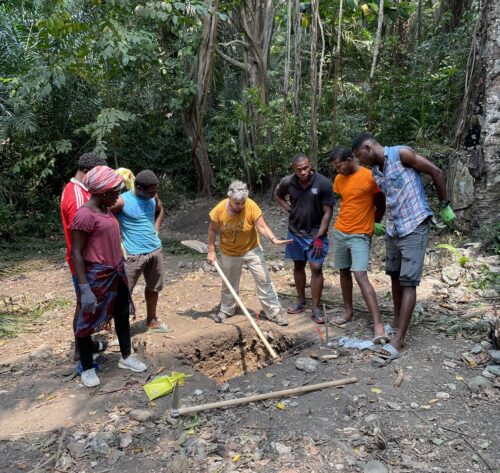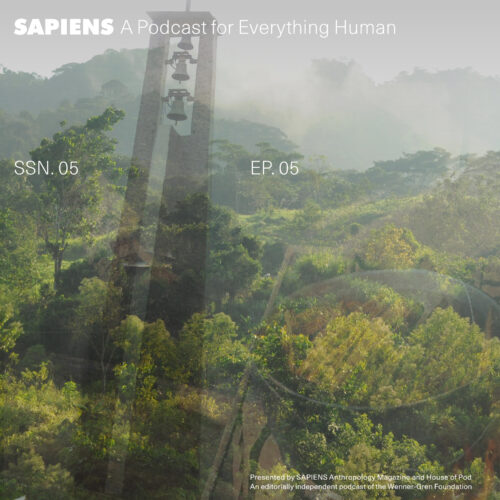Julio Tiwiram is a famous shaman in southeast Amazonian Ecuador. He is also a leading political figure among the Shuar people of Bomboiza. Growing up at the crossroads of social change and colonial conflict, his path to shamanism was anything but straightforward.
As reported by Sebastián Vacas-Oleas, a social anthropologist working with the Shuar people of Bomboiza, we learn how a mysterious shamanic gathering helped Shuar people mobilize their traditional knowledge to fight for their land against settler occupation.
SAPIENS: A Podcast for Everything Human is produced by House of Pod. Cat Jaffee was the editor for this piece, with help from producer Ann Marie Awad. Seth Samuel was the audio editor and sound designer. The executive producers were Cat Jaffee and Chip Colwell.
Sebastián Vacas-Oleas is a postdoctoral affiliate at the School of Anthropology and Museum Ethnography at the University of Oxford. He is also a lecturer and a visiting researcher at the Latin American Faculty of Social Sciences in Ecuador. He is currently working as an editor on a Shuar-authored book of collected life histories, which includes the story of Julio Tiwiram and the events heard in this episode. Sebastián also helps coordinate a project with the Bomboiza Shuar Research Group, funded by the Wenner-Gren Foundation, to study Shuar ancestral locations, migratory movements, women’s gardening practices, and change in Indigenous relations with their land.
SAPIENS is an editorially independent podcast funded by the Wenner-Gren Foundation. SAPIENS is part of the American Anthropological Association Podcast Library.
Check out this related resource:
- You can visit Julio Tiwiram in Kupiamais, his home community, in the Bomboiza land reserve, where he sees patients in his home. You can read more about Bomboiza, its shamans, our forthcoming book, and other shared ongoing projects on bomboiza.org.
Season sponsor:
This episode is included in Season 5 of the SAPIENS podcast, which is part of the SAPIENS Public Scholars Training Fellowship funded with the support of a three-year grant from the John Templeton Foundation.
The Conversion of Julio Tiwiram
Eshe Lewis: What is shamanic power, and how does it affect modern politics in Indigenous Amazonia? In this episode, we follow the life of a young Indigenous activist fighting for his ancestors’ land, and in the process, he discovers his ancestors’ power
My name is Eshe Lewis. This is SAPIENS, and this story comes from producer Sebastián Vacas-Oleas, a social anthropologist who has been working with the Shuar people of Bomboiza in western Amazonia since 2015.
What makes us human?
Sara Hoffman: It’s a wild ride. Brace yourself.
Speaker 3: Imagine the future.
Miss Jeri Hutton Green: I will not be quiet.
Koffi Nomedji: You will have to start from scratch.
Julio Tiwiram: Una revolución aquí en la mente.
Emily Willis: It gives me goosebumps.
Eshe: What makes us human?
Group: Let’s find out.
Eshe: SAPIENS: A Podcast for Everything Human.
Sebastián Vacas-Oleas: It’s 1981. Hundreds of Shuar people, an Indigenous nation in western Amazonia, are protesting. A settler-colonist named Jorge Piedra is invading their land.
There are men and women, young and old. They come from all over Bomboiza. This is a Shuar reserve of some 25,000 acres. It’s located in a little-known corner of southeast Ecuador, very close to the border with Peru. The Shuar have waited 25 years for the government to help them, to provide a legal solution to protecting the land. They are tired of being ignored. So they have decided to take matters into their own hands.
The Shuar assemble in Pakinza, one of the communities in the reserve, and they set in motion a comprehensive plan to take back their land. It involves expelling workers of the intruder Jorge Piedra, taking possession of the disputed land, securing strategic military positions, closing the nearby road connecting the two major settler towns in the area. And then, the final step of their plan is establishing a diplomatic mission to visit all relevant government authorities.
The local state official in charge of land disputes refused to get involved. So what did the Shuar do?
They kidnapped the state official.
Still, after all that, the government refused to negotiate. They sent the police and the military to break down the protest. For more than a week, the conflict was at a standstill. Pakinza was surrounded by squads of policemen. Protesters stood at the ready. And with every passing hour, a violent clash felt more and more imminent. The young Shuar political leaders were running out of ideas.
Julio (Shuar): Se reunieron los mayores, los ancianos.
Julio (English): The elders came together.
Sebastián: Fast forward to 2022. I am sitting with Julio Tiwiram. He’s a celebrated and established Shuar political figure in Bomboiza. Julio is a respected elder—robust and even-tempered. Nowadays, he colors his graying mane black, and he walks with a cane he calls his “horse.”
When the Shuar battled Jorge Piedra and stood up to the Ecuadorian government, Julio was in his late 20s, and he was one of the young leaders organizing the protest. He remembers when the elders came to him.
Julio (Shuar): Empezaron a hablar y dicen bueno, pues, ¿Qué hace? ¿Qué hace nuestra gente? ¿O sea, qué hacemos? ¿Disparar? ¡Cojudos! Nos van a perseguir ante la ley y nos apresan. ¿Entonces dice bueno, nuestra gente para qué se preparó? Nosotros temenos.
Julio (English): The elders wondered what our people shall do. Shoot? That will be stupid. If we, Shuar, use our hunting shotguns to defend ourselves, we would get in[to] further trouble with the law. Instead, they suggested we had psychological weapons we could use.
Julio (Shuar): Nuestras armas, que son psicológicas.
Sebastián: The elders wanted to avoid a massacre. And they had one psychological weapon yet to be deployed: the shamans. In the Shuar language, a shaman is a u[B]ishin.
Julio (Shuar): Reunamos a los uwishin y presionémosles de que les brujeen a los policías que se larguen, porque si esto siguen, vamos a ir con lanzas, vamos a matarlos y ellos van a estar con tiro y nos van a matar. Vamos a matarnos de bando a bando …
Julio (English): Let’s gather our u[B]ishin and tell them to cast a spell on the police, so they clear off. Because if this standstill continues, we are going to charge ahead with our spears and kill them. And they would kill us back with their guns. We will only kill each other, and a massacre will happen.
Julio (Shuar): … Va a haber una masacre.
Sebastián: The following day, Julio remembers that an old lady stood in front of the police and warned them.
Old Woman (Shuar): Senoris policías … [unintelligible]
Old Woman (English): Mr. Policemen, please leave this place immediately.
Old Woman (Shuar): [Old Woman speaking Shuar]
Old Woman (English): If you don’t leave now, one of you will die tomorrow and not see the light of day.
Sebastián: What happened next surprised everyone, except for the elders. Just as the woman had predicted, the following day a policeman died. He had an accident while taking a shower. Then the day after that, another policeman died. He just didn’t wake up. He didn’t make it to see the light of day.
With two officers dead, fear spread like wildfire amid police ranks. And before the third day was over, the police left the Shuar alone.
The intervention of the shamans kept that conflict in favor of Pakinza, and this mysterious event would shape the rest of Julio Tiwiram’s life.
This is the story of how a young Indigenous leader in Amazonia, determined to fight for his ancestors’ land, discovered his ancestors’ wisdom, and how this one Indigenous community kept their land from being grabbed.
Shuar is the word for “people” in the Shuar language. The Shuar have controlled these mountains for so long that there aren’t even accurate records of when they arrived. It’s safe to say they have lived here for over 500 years, and throughout that time, they have resisted or rebelled against all attempt at invasions, be it from the Incas or the Spanish soldiers.
Today, however, things appear different. The Shuar have been invaded but not by any army. A busy interprovincial highway now splits Pakinza in two halves, and the community stands like an island of Indigenous land surrounded by settler-colonists. Jorge Piedra, the settler-colonist who invaded the community, established a 500-acre hacienda that is still Shuar land. He employed poor, displaced people as a workforce and had close connections with the local government.
Julio (Shuar): Jorge Piedra y sus compañeros familiares de él, los señores Castros invadieron abusándose de los Shuar, de los mayores Shuar, haciéndoles tomar orina de caballo, haciéndoles maltratos allí donde amarraban a los chanchos, a los caballos así les …
Julio (English): Jorge Piedra and his family invaded our lands, abusing Shuar people and Shuar elders. He forced them to drink horse pee, and he tortured them—tying them as pigs or horses, hitting them with sticks and machetes.
Julio (Shuar): … maltrataban apalos, a machetes.
Sebastián: So the Shuar came together to fight against colonial encroachment. Pakinza, unlike most Indigenous communities in Amazonia at the time, had a land title. And the Shuar helped organize a fight.
Early in the 1960s, the Bomboiza reserve was established with the aid of the Salesian Order, a Roman Catholic mission working with the Shuar. Then, in 1964, the Shuar and the Salesians founded the Shuar Federation. This created a novel political structure that helped Shuar people manage the land, fend off colonial advances, and defend their interest vis-à-vis the state. This gave authority and prestige to young, educated leaders like Julio Tiwiram.
I asked Julio how he experienced being in that position in his youth.
Julio (Shuar): Muy orgulloso. Todo eso me ayudó también en eso, porque para poner disciplina a la gente, llegar a bien de la gente, se te trepaba y todo. Y yo he formado mucho en el colegio y en la escuela para crear las escuelas, crear los colegios, todo eso para poder ir a la autoridad, pedir, gestionar. ¿Hay autoridades que te ven la cara? Sí. ¿Uno es bien humilde, se le rinde de frente? Sí, cuando hay casos que te toca ser duro.
Sebastián: He replied by saying he was very proud, arrogant, and famously harsh. His harshness was necessary, he says, to deal with often deceitful state officials. Because of what he had seen, he was always wary of military officers.
In 1981, Julio Tiwiram vowed to defend Pakinza. Jorge Piedra had established a large estate that overlapped with Pakinza’s land. These kinds of conflicts were common at the time. The topographical measuring tools were rudimentary, and the national land policy favored agriculture and cattle ranching. Basically, anyone could declare ownership of Indigenous land if he’d promised the state he would chop the forest down and sell crops for the market.
Julio was a young man trying to carve out a political career for himself within the Shuar Federation, and he spotted something very wrong in Pakinza. But when the elders turned to the shamans as their last resort, their psychological weapon, Julio was doubtful. He had been raised as a Roman Catholic believer.
Julio (Shuar): Yo prácticamente en los uwishin. No creía. No creía en los uwishin. Yo era enemigo de los uwishin porque, bueno, yo fui exalumno salesiano.
Julio (English): I didn’t believe in shamans. I didn’t believe in them. I was an enemy of the shamans because I had been a Salesian student.
Julio (Shuar): Los salesianos siempre dijeron que eran brujos y brujos y brujos. Yo dije bueno, brujos, brujos, brujos deben ser.
Julio (English): The Salesians always said that shamans were witches, witches, witches. So I thought, “Well witches, witches, witches, they may be.”
Sebastián: But there were no better options available at the time. So he accepted the elders’ suggestion and told the shamans to prove him wrong. If they were truly capable of doing what they claimed they could do, he would shut his mouth and never call them witches again. That night, and in secrecy, the shamans convened.
Julio (Shuar): Nadie les vio, pero ellos, los siete, nueve, o diez que ellos se reúnen y pudieron hacer todas estas cosas.
Julio (English): No one saw them. Some seven or nine or 10 shamans gathered, and they did what they did.
Sebastián: To this day, Julio has only a vague idea of what the shamans might have done that night. But whatever it was, it worked.
Julio (Shuar): Uno de ellos se va a bañar. Estoy bañar. Estoy por bañar. Le daría un shock que le daría. Ahí cae muerto.
Julio (English): One policeman went for a shower. He had a shock or something. Who knows? But he fell right there in the shower.
Julio (Shuar): A la madrugada, amanece otro chapa muerto, uno de los comandantes. Entonces ya, ya la situación fue grave.
Julio (English): The next morning, another policeman died. This time it was a superior. He began to feel dizzy and began suffering, and the next morning, he just never woke up. Then the situation got very serious.
Sebastián: Julio doesn’t know what to believe at this point. But he perceived a political opportunity that might keep things in his favor.
Julio (Shuar): La segunda novedad que ya estaban dos, dos policías muertos y que estaban asustados. Bueno, yo hago una guerra psicológica, yo digo y si siguen los militares llegando o los policías llegando acá a fastidiarnos durante el día, van a seguir pasando …
Julio (English): Now, rumor said that two policemen had died. Settler people were really scared. I seized the opportunity to start a psychological war. I began telling them, “If more policemen and soldiers keep arriving to hurt us, one by one, they will die.”
Julio (Shuar): … Uno por uno van a ir desapareciendo.
Sebastián: That plan also worked. The police got scared enough as to leave the place.
Julio (Shuar): Al día siguiente dijeron que algunos policías ya empezaron a estar enfermo todos, ya los policías y automáticamente ya con la muerte de los dos, ya fueron llevando los cadáveres, entregar a sus dueños y hacerlo sepelios, todo es un relajo. Allá de la muerte, no volvieron a rodearlos …
Julio (English): The next day, many more policemen began to feel ill. So they took the bodies, and when they had to prepare the funerals, it was all very messy. After the deaths, not even one policeman showed his face.
Julio (Shuar): … Después de a muerte, absolutamente ningún policía se asomó.
Sebastián: Plenty of Shuar were equally surprised.
Julio (Shuar): ¿Cuando vio que se murió el policía? La gente si funciona, si funciona, todo el mundo ahí. La gente dijo ya sí funciona, sino que eso es. Y ahí llegó uno de ellos yy dijo …
Julio (English): When they saw that this policeman had died, our people began saying, “It works. It works. It really works.” Then one of the shamans came and told us …
Julio (Shuar): Si nosotros quisiéramos hacer daño, queridos, nos encargaremos, pero no queremos.
Julio (English): If we’d like to harm you. We could do it, but we simply don’t want to.
Sebastián: After all that happened, the regional government finally decided to send an official out to look at the Pakinza case.
Julio (Shuar): Le sacamos al ingeniero, le sacamos al Jorge de Piedra, les hicimos firmar el documento, ya ellos firmaron, redactó el mismo director que iban a respetar y que no iban a utilizar al jefe que tenía los policías y ya se retiraron.
Julio (English): Together with Jorge Piedra, we had them sign a document. The regional director himself wrote that agreement. The invaders left, and they promised not to call the police again anymore.
Sebastián: To celebrate their victory, people from Pakinza killed a bull, and everyone ate meat and rice and manioc and plantain and drank large amounts of manioc beer. Before the party was over, a group of shamans came to Julio and told him …
Julio (Shuar): Ya nos has probado. Así es que ya sabes cómo funciona esto. ¿Yo qué voy a saber cómo funciona? ¡No sabía nada!
Julio (English): “Now you have tried us. Now you know how shamanism works.” But what did I know about how it works? I didn’t know anything.
Sebastián: I ask him how he felt about that.
Julio (Shuar): ¿Y cómo te sentiste tú? ¿Yo? Bueno, yo viendo todo eso, mi pensamiento era un montón. Me sentí tranquilo porque yo no quería que haya una masacre …
Julio (English): How did I feel? Well, I had a lot of thoughts in my head. I was at peace because I didn’t want a massacre to happen. And I thank God because it didn’t happen, and the problem was over.
Julio (Shuar): Y de un lado bueno, agradecía mi Dios que nos hizo un bien porque ya pasó eso. Y ya se suavizó la situación. El problema se acabó.
Sebastián: That experience left a splinter in Julio’s heart. He couldn’t stop thinking about what the shamans had done and the implications this carried.
Julio (Shuar): Para mi era una revolución aquí en la mente, aquí también en el corazón.
Julio (English): For me, it was a revolution here in the mind but also here in the heart.
Sebastián: And the experience would set him off in a quest for the truth that deeply changed him and shaped the rest of his life.
For a while, Julio Tiwiram went back to his normal self. He was very interested in politics, and he focused on his political career.
Julio (Shuar): Lo más importante para mi era la política. Mis deseos eran pensar, querer ser presidente de la Federación, querer ser presidente de la conaie, de la confeniae, de la conadi. ¿Y pensaba por qué no puedo llegar a ser presidente de la República? Eso eran mis pensamientos.
Julio (English): The most important thing for me was politics. My wish was to be the president of the Shuar Federation. I even thought, “Why can I not be the president of Ecuador?” That was in my mind back then.
Sebastián: The Shuar Federation had been the first Indigenous federation ever to be established in Latin America. Over time, many other such organizations followed in Ecuador and elsewhere.
There was much hope at the time. There is still as much hope that Indigenous politics could help change a country like Ecuador for the better, to make it more equal, more respectful with nature, or kind to its own history. And Julio was in the middle of it all.
But he had all these questions about what had happened in Pakinza with the shamans. So he went to his grandfather, who advised him to begin training as a shaman himself.
Julio began drinking ayahuasca with his grandfather, who explained to him how it worked.
Julio (Shuar): El Señor te va a presentar o te va a hacer llegar a sabiduría a través de alguien, a través de nuestros abuelos antepasados, a través del jaguar, a través del tigre, a través del agua, través de la misma naturaleza.
Julio (English): The Lord will show you, or He will give you wisdom through someone else. Through our ancestral grandparents or through a jaguar or a tiger or through water and nature itself.
Sebastián: And he received a revelation.
Julio (Shuar): Me concentré unos 15 días de ayuno y abstinencia, sincomer, sin beber nada, solo tomando la noche ayahuasca y durante el día solofumando la pipa de tabaco en hoja.
Julio (English): I started by strictly fasting and completely restraining from sex for 15 days. No eating. No drinking. No nothing. I spent the days smoking leaves of tobacco and the nights drinking ayahuasca.
Julio (Shuar): Ya ese era el primer sacrificio para la iniciación. Terminado el 15 días, yo ya me sentí más liviano, me sentí algo diferente, cosa que mis manos, mi energía ya, yaeran otra cosa. Yo sentía que no fui tan materialista, ya estaba más spiritual.
Julio (English): After the first 15 days of the first sacrifice, I felt lighter. I felt different. My hands felt different. My energy was changing. I was becoming less materialistic and more spiritual.
Sebastián: He continued fasting while drinking ayahuasca for another six months and doing it in secret. The discipline he learned through this journey forced him to reevaluate his past experiences and beliefs. He began to study the Bible.
Julio (Shuar): Empecé a leer y leer y leer. En Génesis, nunca encontré de que nunca encontré de que los médicos iban a ser condenados. La Biblia nunca dijo que lo que Dios hizo estaba malo.
Julio (English): I was reading and reading and reading. I never found that the healers must be condemned. The Bible never says that what God created was wrong. In no part does it read that ayahuasca is bad.
Julio (Shuar): No encontré que la ayahuasca era malo.
Sebastián: He concluded that the missionaries had reached their conclusions on shamanism out of ignorance. He trained and researched for two years. And once he became a shaman, he even left politics.
Julio (Shuar): Dije mejor hasta aquí llego, más bien voy a trabajar para que otros jóvenes lleguen y yo más bien voy a dedicarme a la medicina.
Julio (English): I told myself, “This is as far as I can go in politics. Instead, I will focus on healing, and I will work to help young people advance their political careers.”
Sebastián: Through his journey, Julio learned to accept the knowledge of his ancestors and find wisdom in them but also considerable power. And he has become an educator, too, training and introducing other Shuar youngsters into shamanism and even teaching the solutions to have a more nuanced understanding.
Julio (Shuar): Muchos salesianos aceptado y me han agradecido y me han apoyado. Tal vez habrá uno o dos sacerdotes que por ahí medijeron eso es diabólico.
Julio (English): Many Salesians have accepted me. Some have supported me. Others have thanked me. Maybe one or two of them thought I was doing something diabolical.
Sebastián: Some of them are even his faithful clients nowadays.
Julio (Shuar): Yo he logrado hacerles entender y tengo salesianosque son mis clientes en medicina, salesianos que son mis clientes en medicina …
Julio (English): I make them understand. Now, I have many Salesians who are clients of mine. In fact, the great majority of them are my clients. They are my medicine clients.
Julio (Shuar): La gran mayoría de salesianos.
Sebastián: Today Julio Tiwiram remains a devoted Roman Catholic. His experience in Pakinza, however, forced him to look inward and find his fate from his people’s knowledge rather than only from the outside.
Eshe: This episode was produced by Sebastián Vacas-Oleas. Sebastián is currently working on a book about Julio Tiwiram. He received his Ph.D. from the University of Oxford and is currently a lecturer and a visiting researcher at the Latin American Faculty of Social Sciences in Ecuador. He helps coordinate an Indigenous research group in Bomboiza. You can find out more about him in our show notes.
Enrique Contreras interpreted the voice of Julio Tiwiram. Domingo Ankuash and Cristóbal Naikiai helped us fact-check the story. Mauricio Pujupat, Rosa Jimpikit, Gloria Mashutak, and Julio Tiwiram, and their families, offered support, shelter, and encouragement during fieldwork. Sebastián wants to thank all of them for their generous support.
SAPIENS is produced by House of Pod. Cat Jaffe is the editor for this piece, with help from producer Ann Marie Awad. Seth Samuel is our audio editor and sound designer. Our executive producers are Cat Jaffe and Chip Colwell.
This episode is included in Season 5 of the SAPIENS podcast, which is the end product of the SAPIENS Public Scholars Training Fellowship, funded by the John Templeton Foundation. SAPIENS is an editorially independent podcast funded by the Wenner-Gren Foundation, which has provided vital support. Our thanks to Danilyn Rutherford, Christine Weeber, Maugha Kenny, and their staff, board, and advisory council.
SAPIENS is part of the American Anthropological Association Podcast Library. For more information, visit SAPIENS.org and check out the additional resources we offer in the show notes, on our website, or wherever you listen to this podcast. I’m Eshe Lewis. ¡Hasta luego!
